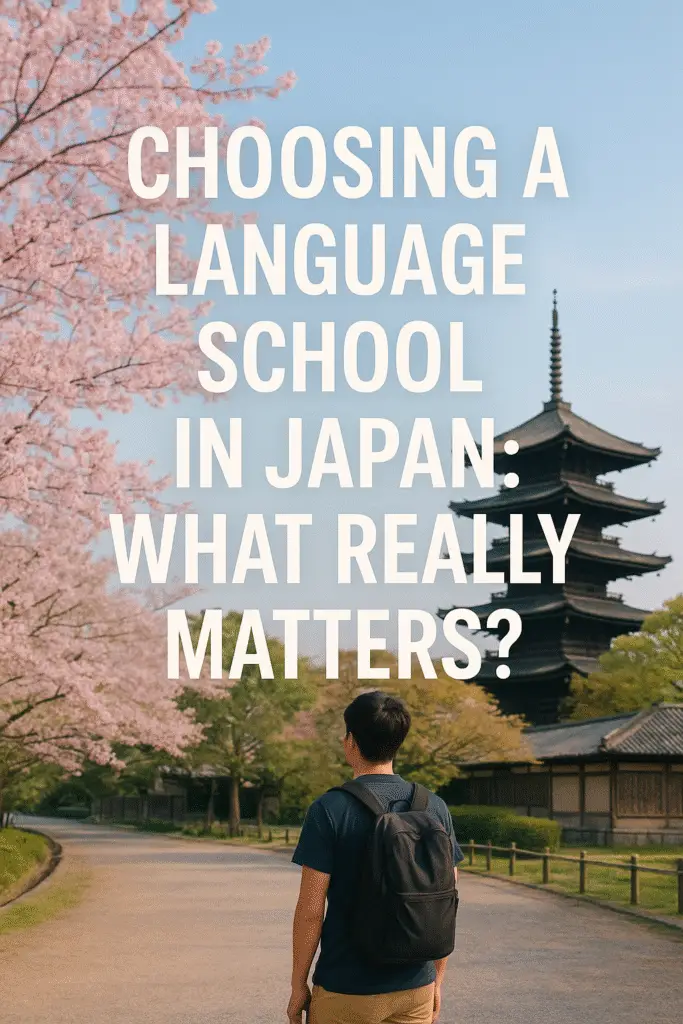When I first decided to study in Japan, choosing a language school felt like the most confusing part. There were so many options, different cities, different prices… and every school claimed to be “the best.” Honestly, at the beginning, I thought it would be simple: just compare prices, check location, read a few Google reviews… and done.
Well… not exactly.
At the time, I didn’t know what actually mattered in the long run. I was only thinking about “How do I get to Japan?”, not “What will happen after I arrive?”
Now that I’ve been here for a while, I finally understand what really makes a language school good (or bad). So let me share what I wish someone told me earlier.
✅ 1. Price Isn’t Everything (But It Matters)
Of course, we all look at price first—totally normal. Japan is expensive, so finding a school that fits your budget is important.
BUT… don’t choose a school just because it’s the cheapest.
Sometimes low tuition = low support, big classes, or zero help with your future.
✅ 2. Location Changes Your Entire Life
Tokyo? Kyoto? Osaka? Small city?
Each one feels completely different.
- Tokyo: busy, fast, more job options, but expensive.
- Kyoto: traditional, calmer, good balance (I chose Kyoto and I love it).
- Smaller cities: cheaper, quieter, but maybe fewer opportunities.
Think about your lifestyle, not just the school.
✅ 3. Google Reviews Help… But Not Always
Yes, I also checked Google reviews a lot.
They are helpful, but some reviews are old, some are emotional, and some schools don’t even have many reviews.
Use them, but don’t rely on them 100%.
✅ 4. The BIG Secret Nobody Told Me:
Check the school’s connections.
This is something I learned after coming to Japan.
Before choosing, I never asked:
- Does this school have partnerships with Japanese companies?
- Can they help me find part-time or full-time jobs?
- Do they have connections with senmon schools or universities?
- Can they recommend me to higher education without entrance exams?
These connections can change your future.
Some schools open doors.
Others just give you a classroom and say “Good luck.”
✅ 5. Support System = Lifesaver
When you first come to Japan, everything is new and confusing.
A good school helps with:
- Visa procedures
- City Hall paperwork
- Opening a bank account
- Finding part-time jobs
- Apartment or dorm
- Even translating documents
If a school doesn’t support you, you’ll feel lost.
✅ 6. Class Quality > Class Size
Some schools say “small classes,” but the teaching quality is still bad.
Some schools have bigger classes, but amazing teachers.
Ask about:
- Teacher experience
- JLPT preparation
- How they place students in levels
✅ 7. Student Nationality Mix
If 90% of students speak your language, you won’t improve your Japanese.
A good mix = more Japanese practice + international friends.
✅ 8. My Experience (Real Talk)
How did I choose my school?
Simple: City + Price + Google reviews.
That’s it. I didn’t think deeper.
It worked okay, but later I realized…
I never asked what the school could do for my future.
If I had known about company connections or university pathways, I might have chosen differently.
✅ 9. So… What REALLY Matters?
If I had to start over, I would focus on:
✅ My long-term goal (study, work, stay?)
✅ School reputation (not just ads)
✅ Future opportunities (partner schools, companies)
✅ Support system
✅ Location + price (but not ONLY price)
✅ 10. Final Advice
Choosing a language school is more than just getting to Japan.
It’s about what happens after you arrive.
Your school can open doors… or keep them closed.
Take your time. Ask questions.
And if you’re not sure, I’m happy to help—because I’ve been exactly where you are right now.
This isn’t just about studying Japanese.
It’s about building your future in Japan.
Discover more from Ali in Japan
Subscribe to get the latest posts sent to your email.

